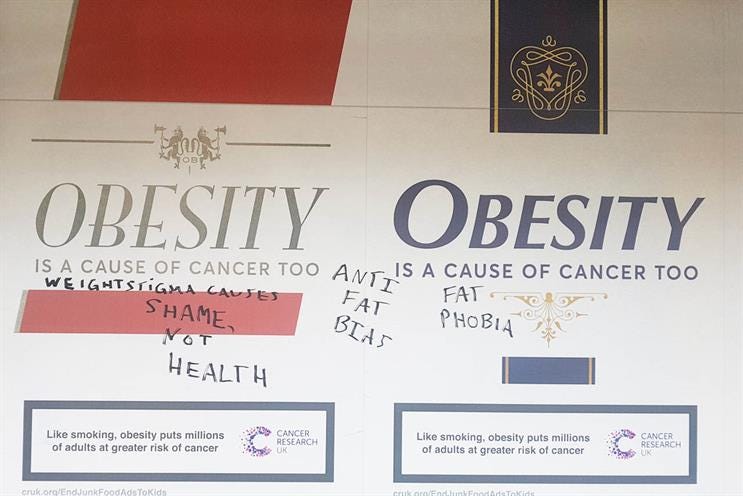We need to separate body positivity from being unhealthily overweight
You don’t have to choose between confidence and honesty
When I was a kid, I was a bit of a chunker. Not really into exercise, really big on reading and even bigger on kebabs. The end result? A fat nerd who got bullied mercilessly in the 80s and 90s. And it wasn’t even uncommon. Kids got absolutely ripped on for anything (kids are fucking brutal). Of course, it didn’t stop there: slagging off anyone a little bit overweight on TV was the norm and the constant source of gossip and trashy news columns. It led to an epidemic of eating disorders and depression and people generally feeling shit about themselves. “Get beach ready” and all that shit. There’s not much worse than making people feel uncomfortable in their own fucking skin – like they hate themselves. Women, obviously, bore the brunt of this, and it’s a standard we’re slow to shake. Men weren’t immune – GQ, FHM and Maxim covers forever adorned with “Get the abs she deserves” etc, etc – but we got off relatively lightly.
And then body positivity came along. People were binning the shame and just being happy. And fucking yes to that. I see crop tops and other ‘90s trends have burst back into fashion (although everyone looks way cooler now wearing what I used to wear… rude) and people in all shapes and sizes flaunting midriffs with wanton abandon. It’s brilliant to see people being content with how they look. I’m for anything that echoes, “Fuck you, I won’t do what you tell me.” Yes, the drive for some transient bullshit idea of beauty is still there, but it’s way less narrow than it once was.
But – and there’s always a but – there’s a difference between being comfortable in sporting a few extra kilos, and holding so much extra weight that it negatively affects your health. I know we don’t like to talk about it or admit it, but being overweight is a huge factor in health. Being obese is linked with a litany of disorders (cardiovascular disease, dyslipidemia, and insulin resistance, which can lead to diabetes, stroke, gallstones, fatty liver, hypoventilation syndrome, sleep apnea and cancers.)1Here are some stats from WHO, just to put it into context (and the stats are, frankly, grim):2
In 2022, 1 in 8 people in the world were living with obesity.
Worldwide adult obesity has more than doubled since 1990, and adolescent obesity has quadrupled.
In 2022, 2.5 billion adults (18 years and older) were overweight. Of these, 890 million were living with obesity.
In 2022, 43% of adults aged 18 years and over were overweight and 16% were living with obesity.
In 2024, 35 million children under the age of 5 were overweight.
Over 390 million children and adolescents aged 5–19 years were overweight in 2022, including 160 million who were living with obesity.
“Yeah but correlation isn’t causation” I can already hear you crying. And it’s not, you’re right. But there’s a bunch of research that makes a causal link between obesity and disease. One good example that systematically reviewed multiple published large studies concluded there is a causal role for excess fat in multiple chronic diseases, including specific types of cancer. There is a very strong causal relationship between obesity and certain cancers.3 There are multiple others you can go and look at if you’re interested (like gastrointestinal diseases,4 kidney disease5 and even depression6).
And yeah, this is a difficult topic. But we can safely say being overweight is bad for health. The problem here is too many are quick to jump on the wagon and say, “I’m happy with my weight, you can’t tell me how to live!”. That’s cool. If you’re happy with your weight, that’s fine. As long as you’re aware of the health risks that come with it. We’ve got ourselves into a weird situation where too many are needlessly defensive and unable to talk logically about delicate subjects.
And I get it – that reluctance to talk about weight and health is often rooted in compassion – a fear of further marginalising people who already cop a lot of shit from society. That’s understandable. But if we don’t make room for a grown-up conversation about weight, health and personal responsibility on our terms, we leave it wide open for someone else to hijack the topic with theirs.
This causes a host of issues where we can’t sensibly and politely discuss sensitive and nuanced topics that might be seen as either non-inclusive or critical of how people live. The result is a wave of body-zealous advocates who outright refuse to separate the notion that being overweight is a massive health risk from being happy with how they look.
A great example is Cancer Research UK’s cancer and obesity campaign. The first launched the ad below and suffered backlash. An open letter was sent to Michelle Mitchell, chief executive of CRUK, saying,
"Implying that individuals are largely in control of and responsible for their body size (and therefore cancer) supports a culture of blame and plays into prejudices and negative stereotypes, which drive the social exclusion, marginalisation and inequality of an already stigmatised population. The evidence is clear that weight stigma actively discourages people from engaging in behaviours that are known to promote health and reduce cancer risk."
Someone else on twitter said,
"Cancer Research UK has again stirred the fat-hate pot with another careless anti-obesity campaign.”
They later toned it down. But the fact is, obesity is a cause of cancer. This wasn’t about fat-shaming or shitting on body positivity, but the two topic became intertwined. “I enjoy my [overweight] shape” and “Being obese is linked to a bunch of diseases” are distinct discussions that can and do exist simultaneously. This whole thing boils down to our collective failure to separate facts from personal feelings.
This isn’t about dragging people down or reverting back to fat-shaming or all that toxic bullshit we had to live through. It’s about separating two things that are often clumsily lumped together: being happy in your own skin and pretending that that skin doesn’t come with real biological baggage if you’re carrying too much around. You can be proud, confident, sexually fucking radiant and still be medically at risk. These things are not mutually exclusive. And we have to be able to talk about that.
If we’re grown-ups, then we should be able to hold these ideas at the same time without throwing tantrums. Saying obesity increases your health risks isn’t an attack on your character, or your politics, or your freedom – it’s just one part of the reality of existing in a body. And I get it, bodies are political. But we can’t shy away from facts because we’re scared of what some bigot might say with those same facts. They’re still true – even if they’re wielded by wankers.
So be loud, be happy, be half-naked in the sun with a beer and belly and the confidence of a Greek god – just don’t pretend that carrying an unhealthy amount of weight isn’t exactly that: unhealthy.
Love yourself. But also, look after the only self you ever get. You don’t have to choose between confidence and honesty. Hold space for both.
Refs
Panuganti, K. K., Nguyen, M. & Kshirsagar, R. K. Obesity. in StatPearls (StatPearls Publishing, Treasure Island (FL), 2025).
Obesity and overweight. https://www.who.int/news-room/fact-sheets/detail/obesity-and-overweight.
Larsson, S. C. & Burgess, S. Causal role of high body mass index in multiple chronic diseases: a systematic review and meta-analysis of Mendelian randomization studies. BMC Medicine 19, 320 (2021).
Kim, M. S. et al. Causal effect of adiposity on the risk of 19 gastrointestinal diseases: a Mendelian randomization study. Obesity (Silver Spring) 31, 1436–1444 (2023).
Xu, X. et al. Contributions of obesity to kidney health and disease: insights from Mendelian randomization and the human kidney transcriptomics. Cardiovasc Res 118, 3151–3161 (2022).
Jokela, M. & Laakasuo, M. Obesity as a causal risk factor for depression: Systematic review and meta-analysis of Mendelian Randomization studies and implications for population mental health. J Psychiatr Res 163, 86–92 (2023).




